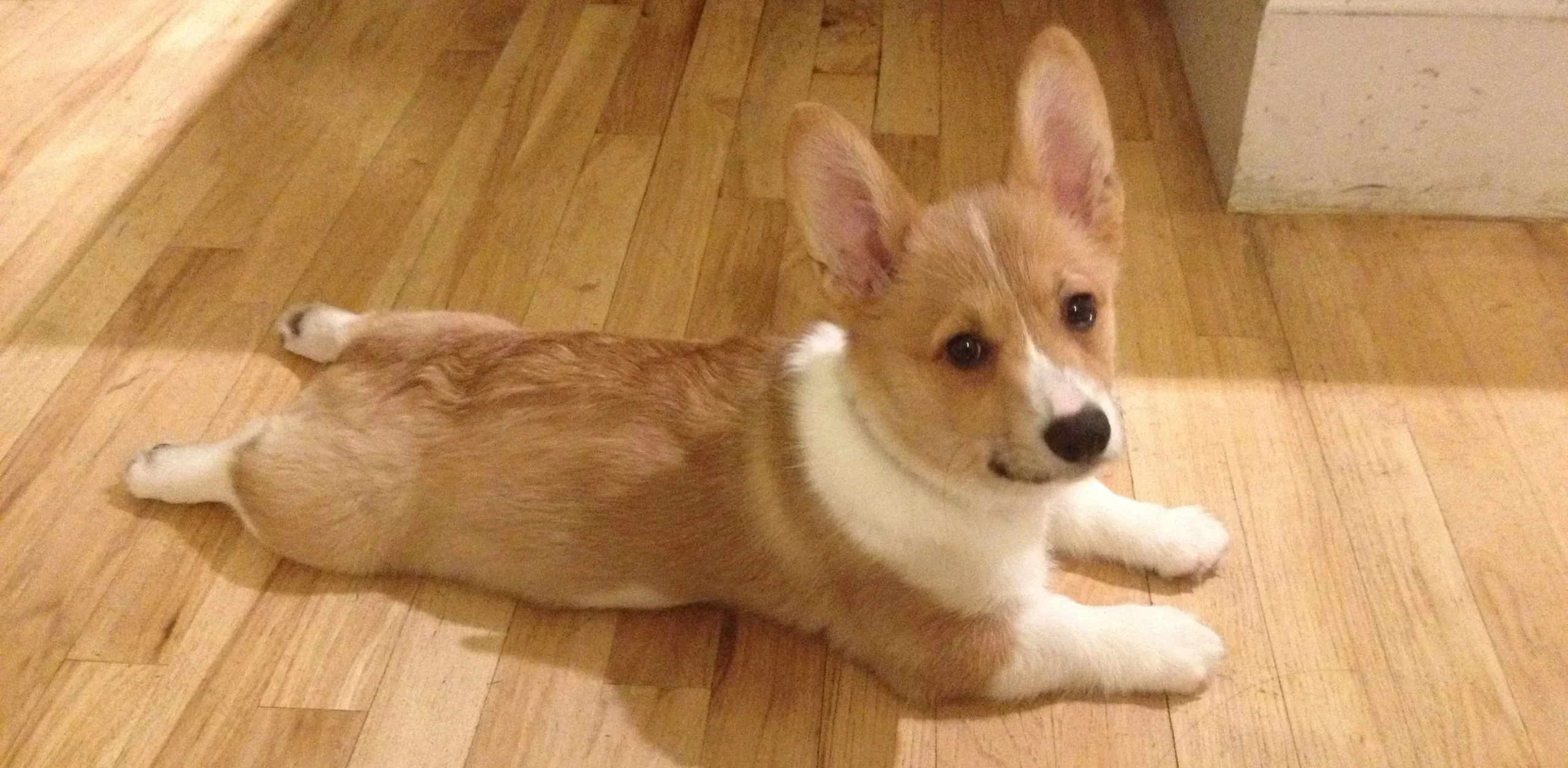You’ve probably seen Corgi splooting all over social media as an internet sensation, but what exactly is splooting and why do Corgis do it? In this blog post, we will explore the factors behind this quirky Corgi behavior and what it can tell us about our furry friends.
A Corgi sploot is when a Corgi lays on its stomach with its hind legs extended straight behind it. Other dog breeds (including larger breeds) from German Shepherds to Labrador Retrievers, as well as cats perform sploots as well (though in that case it’s a cat sploot!). A dog sploot may look silly, but it’s actually quite comfortable for them!
Table of Contents
What is splooting?
First, let’s define what dog splooting is:
A full sploot is when a dog has its hind legs fully extended behind it.
A reverse sploot is when a dog is on its back and is fully stretched out.
A half sploot is exactly how it sounds. One of the back legs are tucked and the other one is extended.
A side sploot is when one back leg is stretched to the side and the other is tucked.
As you can see, the sploot position is a multi faceted maneouvre for the hip flexors!
Why do Corgis sploot?
One reason corgis may sploot is due to their unique body shape. Corgis have a distinct “cardigan” shape, with their elongated bodies as well as being a short-legged breed. This shape can make it difficult for them to find a comfortable position when laying down. By splooting, they are able to do a full-body stretch with their back legs and relieve any tension in their backs.
Another reason corgis may sploot is due to their thick fur. Corgis have a double coat, which can make them quite warm in the summer months. By splooting on a hot day, they are able to expose their belly and underbelly to a cool surface, helping them regulate their body temperature.
Furthermore, Corgis are known for being very active breeds. They have a lot of energy and need a lot of exercise. Splooting can be a way for them to relax and rest their muscles after an intense play or training session and do some dog stretching.
Lastly, splooting can also be a sign of trust and relaxation. Dogs that feel safe and comfortable in their environment are more likely to show off their belly and be in a relaxed position. If your corgi is splooting, it is a good sign that they feel happy and secure in their surroundings.
Can Splooting Be Bad?
Some experts suggest that splooting could be bad for a dog’s physical health. When a dog sploots, their hips and pelvic area are put under strain as their legs are splayed out to such an extent. This unnatural position can lead to long-term issues such as hip dysplasia and arthritis. Additionally, splooting could also strain the dog’s ligaments and joints, potentially causing pain and discomfort.
It is important for pet owners to be aware of the potential risks associated with splooting and to discourage their dogs from adopting this position. Encouraging dogs to sit or lay in more natural positions can help prevent any potential complications later in their lives. Ultimately, while splooting may be cute and entertaining, it is crucial to prioritize the well-being and health of our furry companions.
Why Doesn’t My Corgi Sploot?
Corgis are known for their adorable and quirky behaviors, such as the dog sploot. However, it is not uncommon for some Corgis to not sploot. There could be a few reasons why your Corgi doesn’t sploot. Firstly, every dog has its own preferences and personality traits. Some Corgis may simply not enjoy splooting and prefer to sleep or rest in a different position.
Additionally, splooting can be quite uncomfortable for some dogs, especially those with certain physical conditions or injuries. Since Corgis have short legs and a long body, it is possible that splooting may cause strain or discomfort to their joints or muscles. It is important to remember that not all dogs will engage in the same behaviors and that it is perfectly normal for your Corgi to have unique preferences and comfort levels. As long as your Corgi is happy, healthy, and comfortable, it is perfectly fine if they don’t sploot.
Do All Corgis Sploot?
Splooting is something that every Corgi does, but it doesn’t necessarily mean something is wrong. Splooting may seem odd to those unfamiliar with the term, but it simply refers to when a Corgi prefers to lay on their belly with their back legs stretched out behind them. While not all Corgis sploot, it is a common behavior among this breed. Some Corgis sploot like it’s second nature, while others may only do it occasionally.
The reasons behind this quirky behavior are not completely understood, but it could be related to temperature regulation or simply a way for the Corgi to get comfortable. So, if you find your Corgi splooting, rest assured that it is a normal behavior for this breed and not necessarily a cause for concern.
Can corgis sploot on their backs?
Corgis are notorious for their adorable and viral splootings. The term “sploot” refers to the way corgis stretch their hind legs behind them, often while lying on their stomachs. But can corgis sploot on their backs as well? The answer is yes, they can! While it may not be as common as the traditional belly-down sploot, corgis can indeed reverse sploot, which involves stretching their hind legs out behind them while lying on their backs. This variation of the sploot is equally delightful and hilarious to witness.
Whether it’s belly-up or belly-down, corgis never fail to bring joy with their sploots. It is believed that the reverse sploot is a way for corgis to cool themselves down, expose their bellies for a tummy rub, or simply find a comfortable position to relax. No matter the reason, corgis continue to captivate us with their unique and charming splooting behaviors.
Conclusion
In conclusion, the splooting habit may look silly, but it is an important behavior for corgis and is not a health issue or indicative of joint issues at all. It allows them to stretch out their legs and hips, regulate their body temperature, rest their muscles and relax. As a dog owner, it’s important to understand the reasons behind this behavior and to create a comfortable and safe environment for your corgi to sploot to their heart’s content.



